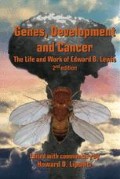Females homozygous for the sex-linked dominant, Bar, occasionally give rise to wild-type reversions and to forms with more extreme eye reduction than Bar. This behavior was shown by Sturtevant to result from unequal crossing over. The Bar-reverted type was considered to be a deficiency for the Bar gene; while the extreme form, called Ultra-Bar or Double-Bar, was interpreted as a duplication for that gene. Later, Wright suggested that Bar itself had something additional present which when lost by unequal crossing over would give back a normal chromosome (Bar-reverted).
Access this chapter
Tax calculation will be finalised at checkout
Purchases are for personal use only
Preview
Unable to display preview. Download preview PDF.
Editor information
Editors and Affiliations
Rights and permissions
Copyright information
© 2007 Springer
About this chapter
Cite this chapter
Lewis, E.B. (2007). Another Case of Unequal Crossing Over in Drosophila Melanogaster. In: Lipshitz, H.D. (eds) Genes, Development, and Cancer. Springer, Dordrecht. https://doi.org/10.1007/978-1-4020-6345-9_2
Download citation
DOI: https://doi.org/10.1007/978-1-4020-6345-9_2
Publisher Name: Springer, Dordrecht
Print ISBN: 978-1-4020-6343-5
Online ISBN: 978-1-4020-6345-9
eBook Packages: Biomedical and Life SciencesBiomedical and Life Sciences (R0)

